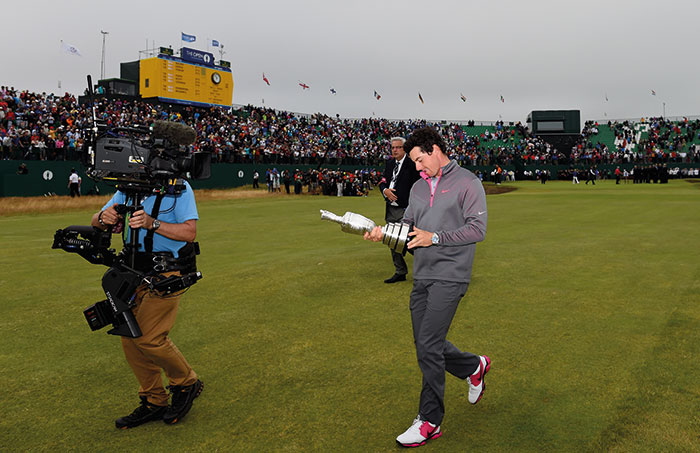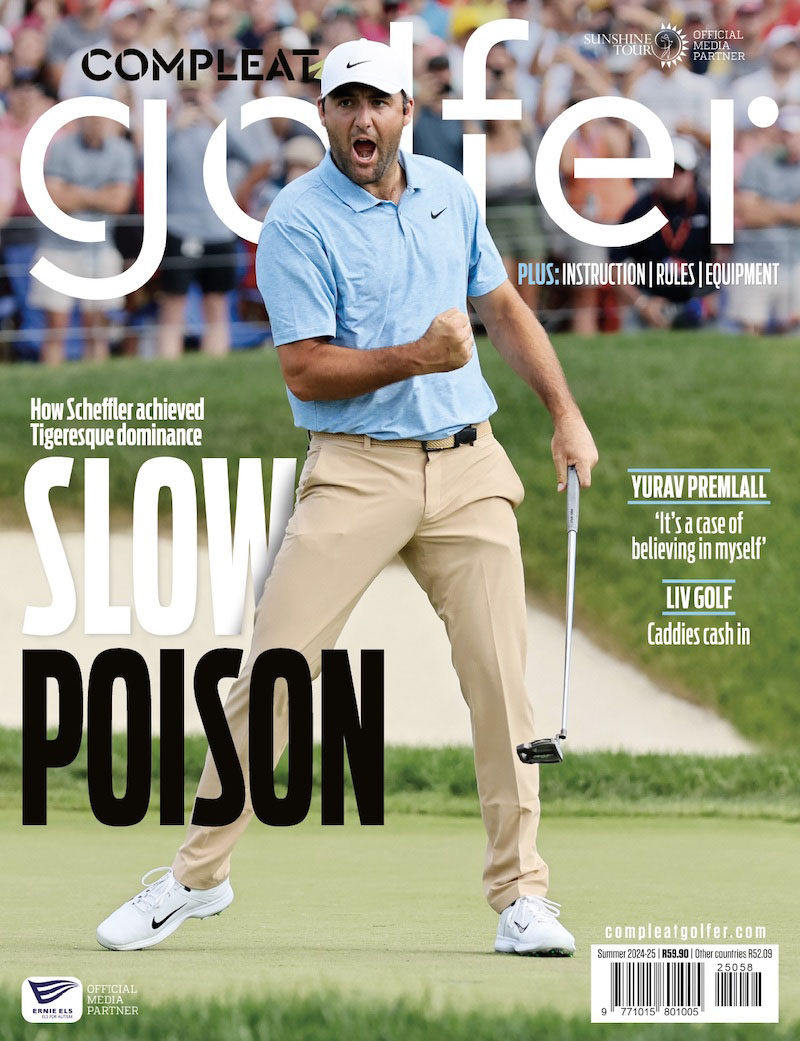By James Corrigan
A new season, but the same Rory McIlroy; breathtaking in his brilliance one day, frustrating in his inconsistency the very next. Golf’s poster boy may be getting older and wiser but the narrative still seems as helter skelter as ever as we approach the year’s second Major.
We should be used to McIlroy shocking us by now, but for some reason the bumps in the road still come as a surprise. After finishing 2015 in such style in Dubai, the majority expected the Ulsterman to hit the road running in the new year, but there we were going into The Players Championship, his ninth event of the campaign, awaiting his first win and with the question marks flashing.
A quick scan through his biog, however, would have reminded us that this was not out of the McIlroy norm. In fact, what should raise the hair follicles if it ever does appear simple for this most pure of golfers. The motion looks effortless, no doubt, but that does not necessarily mean it will be plain-sailing for McIlroy. Anything but.
When he was a 23-year-old I sat down with him when he was in the midst of one of his ‘slumps’ and he felt obliged to expand on what some sensitive souls had considered an utterly outrageous statement at the Texas Open that week. That is the way it always has been for McIlroy: explaining himself. Why did he change clubs, why did he walk off, why did he sound off?
This particular ‘controversy’ concerned McIlroy saying he would not care if he missed 10 cuts in a row if won one Major a year. ‘Just imagine Tiger ever admitting that?’ went the cry. Yes, just imagine. But McIlroy is not Tiger Woods, the phenom to whom everyone long ago declared he was heir.
After all, McIlroy had already missed more cuts in five years as a pro than Woods had missed in his 17 years. Furthermore, is there not something ever so slightly different in their personalities, if not their ambitions?
‘Things seem to happen to me, things that tend to generate headlines,’ McIlroy told me. ‘That’s not a bad thing. I don’t want to compare myself to anyone, but if you look at Phil Mickelson, that’s why so many people are drawn to him. He’s either way up or he’s down. Those highs and lows make him seem more real, less like a machine.
‘That’s why the public loves [the British snooker player] Ronnie O’Sullivan. They see the human in him; because everybody has good days and bad days. Now, I hope I’m not as extreme as Ronnie but I do feel as if there will always be highs and lows in my career.’
How prescient he was proved to be. But then, what else could he think at that time? After winning the PGA title by eight strokes in August 2012, McIlroy was hailed as Mr Infallible as he proceeded to win four of six starts against the very best opposition. He went into that Christmas rivalling Father Christmas in the popularity stakes. But then he signed a multimillion-dollar deal to swap to Nike and in the tumult of critics so generously reminding him of hubris, he began 2013 as Mr Unfathomable.
There were extended breaks, missed cuts, a first-round knockout in the World Matchplay, a petulant mid-round withdrawal at the Honda Classic and although he remained winless until Australia in December, the player himself never lost hope. Among all the wailing he pointed out he had suffered these blips before and had always bounced back.
‘We always go on about consistency but I always stop and think: “What if I finished 10th every week?”’ McIlroy said. ‘I’d make a great living, be in all the great events – but it’d be pretty dull. I’d never get that feeling that I’ve beaten everyone there is to beat that week, that incredible buzz. I know it doesn’t have to be a trade off, but all I’m saying is that if I have to take the down moments to experience those huge highs, I’ll take them.’
What does suit McIlroy is Augusta – or it should. It is the one Major he was seemingly born to win, but is the one he has yet to win. If he can don a Green Jacket he can join those golfing dons in the pantheon who have completed the career Grand Slam – Gene Sarazen, Ben Hogan, Jack Nicklaus, Gary Player and Woods.
Yes, McIlroy calls The Masters his ‘favourite tournament of the year’ but it is fair to say the infatuation is not reciprocated. Love might be cruel on occasion, but even the Marquis de Sade would be baffled at his Augusta affection.
‘It’s a golf course, not a person!’ McIlroy told me on another occasion. ‘And the way I see it is that it’s actually like saying you don’t like someone because of something they said years ago. Get over it, move on. The 10th, that’s one of my favourite holes anywhere and people ask how can you say that after what it did for you, with that seven and the cabin and everything [on his way to a final-round 80 at the 2011 Masters]? It didn’t do anything to me – I did it to me. I’ve learned how to play that hole, learned not to hit driver. They say the more you go back to Augusta the more you know where not to bite off too much.’
Yet this year, McIlroy left Georgia believing he had been ‘too respectful’ to Augusta and veered away from his young win-or-bust self. A tie for 10th was not what he expected when he awoke on Saturday morning.
‘I was in a great position going into the weekend, a shot back in the final group and I just didn’t play the golf I needed to when it really mattered. That’s the thing I take away not just from this week, but from previous Masters. I’ve been in position before and I haven’t got the job done when I needed to, and I don’t think that’s anything to do with my game, I think that’s more me mentally and I’m trying to deal with the pressure of it and the thrill of the achievement if it were to happen. I think that’s the thing that’s really holding me back.’
McIlroy is unfailingly honest. It is hard to think of another pro who would admit to a failing between the ears; if only because it would further threaten Augusta becoming a stigma in his career. Yet that is exactly what it is turning into for McIlroy and he knows what he must to do to thwart it – be himself.
‘This is the one I haven’t won and this is the one I want to win more than anything else,’ he said. ‘I’ve won a Claret Jug, a Wanamaker Trophy, a US Open, but this is the one I haven’t. Once I overcome that mental hurdle I’m struggling with at the minute, I know how to play this course. I’ve played it very well before, and I can string good rounds together here. It’s just a matter of doing it.
‘It’s almost as if I need to go out there and not respect the place as much, and not really care where I miss it or where I don’t miss it. Everyone talks about how at Augusta “you need to miss it here”, “you need to miss it there”, “it’s all about your misses”; but I would rather hit it right on line than miss in the right place. So, yeah, I just, I was a little too careful out there [in his third-round 77], trying to just be too tentative, I guess. I don’t know how else to describe it.’
McIlroy was befuddled. In truth, just like his many admirers, he had not expected to be going into May without a trophy to his name. But perhaps more than any big-time sport, golf has a habit of ensuring there are lows to visit, no matter how long the succession of peaks. For McIlroy it came in 2015 on that Astroturf pitch near his home win Bangor where he went over on his ankle. Before that moment in a kickabout with friends, McIlroy was bubbling, with three titles to his name, as well as two top-10s behind Spieth in the campaign’s opening pair of Majors. How quickly his aspirations were deflated, lying there with a ruptured tendon he feared would rule out the rest of the year.
As it happened, McIlroy was only to miss three tournaments – the Scottish Open and his defences at the Open and the WGC-Bridgestone Invitational – and we was able to claw back some consolation by winning a third European Tour Order of Merit. McIlroy took great heart from that season-ending win at the DP World Tour Championship, where he held off an inspired Andy Sullivan down the stretch. ‘It was the first time since the injury that I got a bit of speed back in my swing, I was hitting it long and I finally was playing how I wanted to play again. There’d been progress but it just sort of all came together in Dubai and it makes me excited about next year.’
So McIlroy’s vision is restored and in more ways than the metaphorical. Of course, it was inevitable that his engagement to Erica Stoll would attract all the headlines in the past month and he is quite certain such blessed stability in his home life will only help his game. Yet in terms of the nitty, gritty of his profession, his second operation of the year may be more resonant. In 1999, Woods underwent laser eye surgery and the next season won three Majors. Could it have a similar effect on McIlroy?
He thought it could. In 2014, he had won back-to-back Majors and established himself as the undisputed world No 1. But there followed the rise of Spieth and Jason Day and suddenly he was the third of the new Big Three. It was not a mantle which sat well. ‘I know I have the ability to be the best player of this generation,’ he said. ‘I just need to put in the work and for things to click.’
And that is it with Rory. When he clicks he wins and not only does he win, but he makes the rest look stupid, just like Woods did in his hegemony. But for McIlroy the era of domination will never be Woods-like. It will come in short, fantastic bursts, when everything appears so straightforward, so natural and so exciting. That’s just McIlroy. And we should be resigned to the fact it will be his curse as well as his blessing.
END OF YEAR RANKING
2005 1182
2006 1309
2007 232
2008 39
2009 9
2010 10
2011 3
2012 1
2013 6
2014 1
2015 3
2016 3
(As at 16 May 2016)








